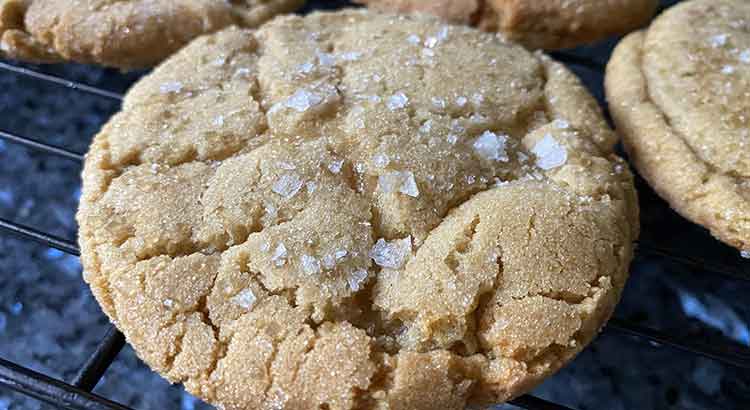Why are my sugar cookies hard? It’s a question that many of us have pondered while staring at a tray of disappointing treats. But fear not, my fellow baking enthusiasts! In this article, we’ll delve into the seven common problems that can cause your sugar cookies to turn out harder than desired. Don’t worry, though. I’m here to guide you through these baking hurdles and help you achieve soft, tender, and delicious sugar cookies that will make your taste buds dance with joy.
One of the most common reasons why your sugar cookies turn out hard is using the wrong flour type, like all-purpose flour with higher protein content. This results in the development of too much gluten, making it difficult for the cookies to retain moisture and leading to a harder texture.
So, gather your ingredients, and let’s dive into the world of sugar cookies. Get ready to unlock the secrets to soft and heavenly treats that will have everyone coming back for more.
Using Margarine or Low-Fat Substitutes
Sometimes, in an effort to make healthier choices, we may opt for margarine or low-fat substitutes when baking sugar cookies. However, these alternatives can affect the texture of the cookies and make them harder than desired.
Margarine has a higher water content compared to butter, which can lead to cookies that spread more and become crispier. Additionally, low-fat substitutes often lack the richness and moisture that butter provides, resulting in drier and tougher cookies.
If you want to achieve soft and tender sugar cookies, it’s best to stick to using regular butter. Butter contains a higher fat content, which helps create a more tender texture and adds flavor to the cookies.
Inadequate Creaming of Fats and Sugars
Another reason your sugar cookies may turn out hard is if you haven’t properly creamed the fats and sugars in the recipe. Creaming refers to the process of combining softened butter or margarine with granulated sugar until the mixture becomes light and fluffy.
When you cream the fats and sugars adequately, it helps incorporate air into the dough. The trapped air creates pockets that contribute to a softer and more tender texture in the finished cookies. If the creaming process is rushed or not done properly, the cookies may end up dense and hard.
To ensure you achieve the desired texture, be patient and take your time when creaming the fats and sugars. Start with softened butter or margarine and beat them together with granulated sugar until the mixture is pale and fluffy. This may take a few minutes of beating, but it’s worth the effort for soft and delicious sugar cookies.
Wrong Flour Type
When baking sugar cookies, it’s essential to use the right type of flour. All-purpose flour is the most commonly used flour for baking, but it may not be the best choice for sugar cookies. All-purpose flour contains a higher protein content, which can result in a tougher texture. Instead, opt for a lower protein flour, such as cake flour, which will produce softer cookies.
Using the wrong flour type can lead to the development of too much gluten in the dough, making it difficult for the cookies to retain moisture and resulting in a harder texture. So, next time you bake sugar cookies, make sure to check if you’re using the appropriate flour.
Lack of Moisture in the Dough
Another factor that can contribute to hard sugar cookies is a lack of moisture in the dough. The dough needs enough moisture to ensure the cookies stay soft and chewy.
If you find that your sugar cookies are turning out dry and hard, it’s possible that the dough is too dry. This can happen if you inadvertently add too much flour or don’t include enough liquid ingredients, such as eggs or milk.
To prevent this issue, make sure to measure your ingredients accurately and follow the recipe instructions carefully. If the dough seems too dry, you can try adding a tablespoon or two of milk or water to moisten it slightly. This will help create a dough that is easier to work with and yields softer cookies.
Insufficient Fat
The fat content in sugar cookies is crucial for achieving a soft and tender texture. If your cookies are consistently turning out hard, it’s possible that the dough lacks sufficient fat.
Fat helps keep the cookies moist and adds richness to their flavor. Without enough fat, the cookies can become dry and crumbly. So, if you’re experiencing hard sugar cookies, try increasing the amount of fat in your recipe.
Consider using more butter or adding an extra egg yolk to the dough. These additions will boost the fat content and result in softer and more tender cookies. Just be mindful of any other adjustments you may need to make to the recipe to maintain the proper balance of ingredients.
Remember, fat is an essential component in achieving the desired texture of your sugar cookies. So, don’t skimp on it if you want soft and delicious treats.
–
Not Using Brown Sugar
If you’re wondering why your sugar cookies turn out hard, it could be because you’re not using brown sugar in your recipe. Brown sugar adds moisture to the dough and helps create a softer texture in the cookies.
Brown sugar contains molasses, which contributes to its moistness and chewiness. When you use only granulated sugar in your sugar cookies, you miss out on the benefits of the molasses in brown sugar. This can result in cookies that lack moisture and end up being harder than desired.
To improve the texture of your sugar cookies, try using a combination of both granulated sugar and brown sugar in your recipe. The brown sugar will help retain moisture and add a touch of caramel flavor to the cookies. This simple adjustment can make a significant difference in the final outcome of your baked treats.
Not Preheating the Oven
One often overlooked step in baking sugar cookies is preheating the oven. Failure to preheat the oven can affect the baking process and lead to cookies that are too hard.
When you place cookie dough in a cold oven, the cookies will take longer to bake. During this extended baking time, the cookies can become overcooked and lose their moisture, resulting in a harder texture.
To ensure your sugar cookies bake evenly and retain their softness, it’s important to preheat your oven. Preheating allows the oven to reach the proper temperature before you put the cookies inside. This helps the cookies bake at the right rate and prevents them from drying out.
Before you start baking your sugar cookies, take a few minutes to preheat your oven to the temperature specified in the recipe. This simple step will go a long way in achieving the desired texture of soft and tender cookies
Final Thoughts
And there you have it, my baking friend! We’ve explored seven common problems that can make your sugar cookies hard. By understanding these issues and making a few simple adjustments, you can turn those disappointing cookies into soft and delightful treats.
Remember to use the right flour type, opting for lower protein options like cake flour. Take your time to adequately cream the fats and sugars, creating a light and fluffy mixture. Be cautious about using margarine or low-fat substitutes, as they can result in drier and tougher cookies.
Don’t forget about moisture! Ensure your dough has enough moisture by measuring ingredients accurately and adding extra liquid if needed. And of course, don’t skimp on the fat. Butter adds richness and moisture to your cookies, so be generous with it.
Oh, and let’s not overlook the benefits of brown sugar and preheating the oven. Brown sugar brings moisture and flavor to your cookies, while preheating ensures they bake evenly and retain their softness.
Now, armed with these insights, it’s time to head back to the kitchen and create those perfect sugar cookies. Remember to embrace the joy of experimentation and have fun along the way. Happy baking, and may your sugar cookies always be soft, chewy, and utterly delicious!

